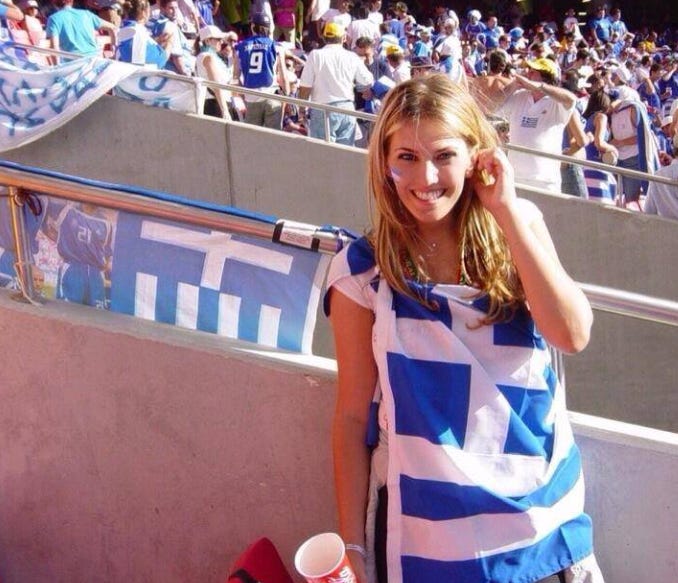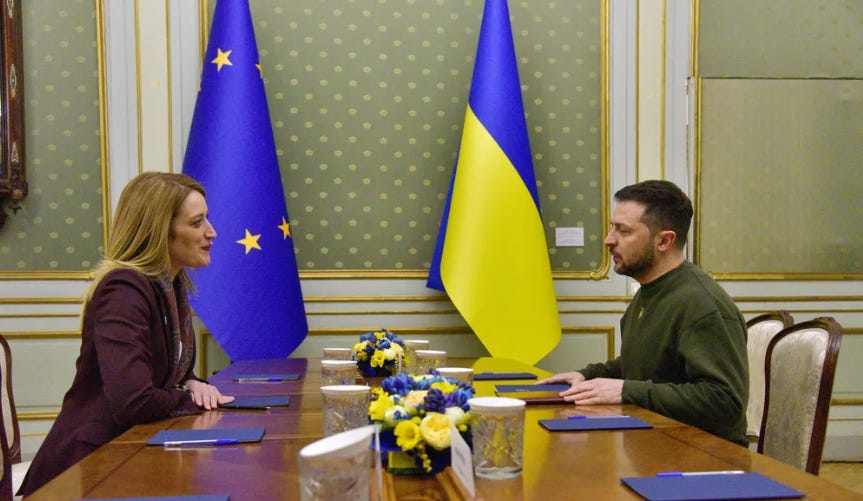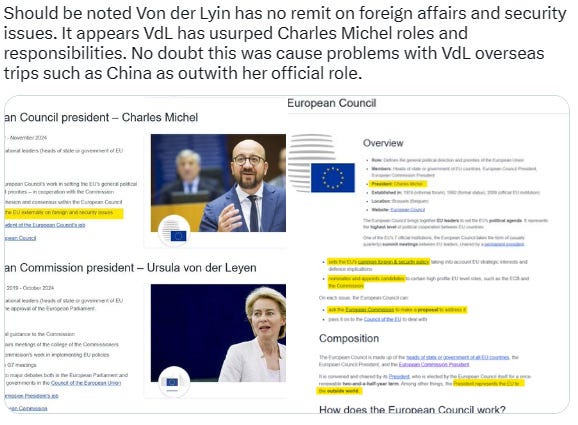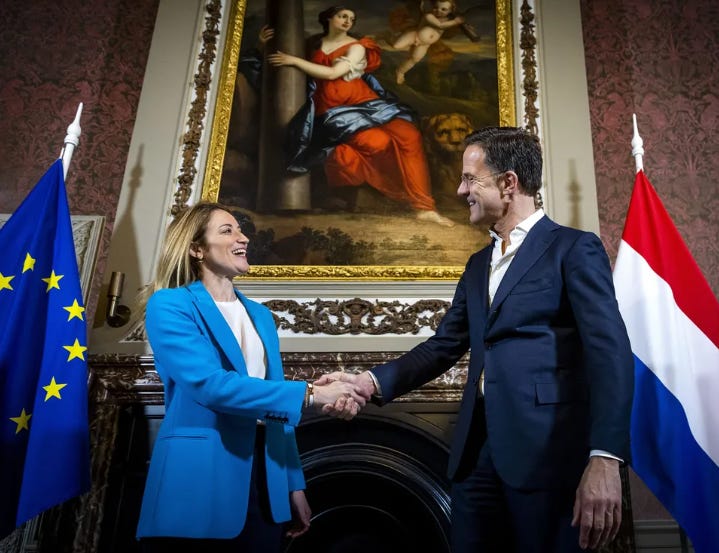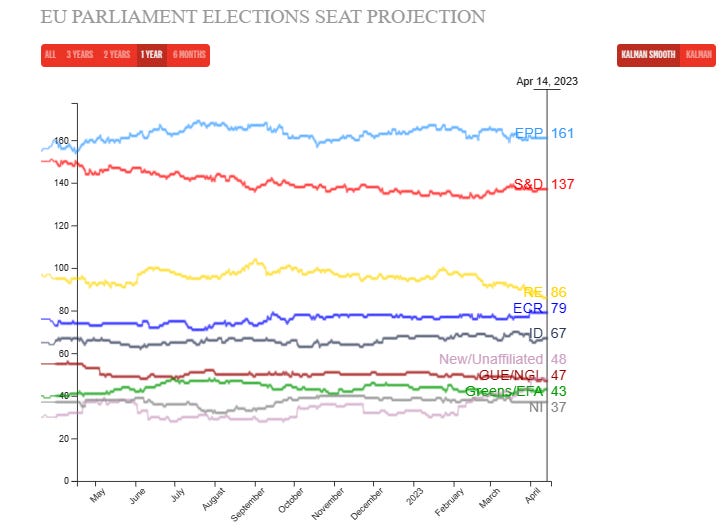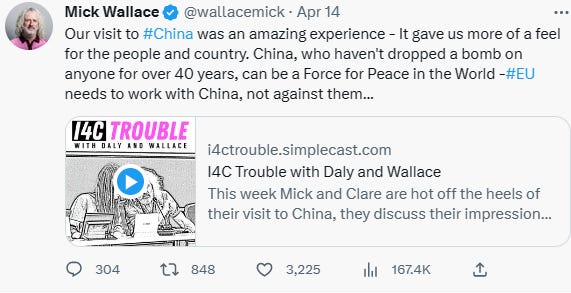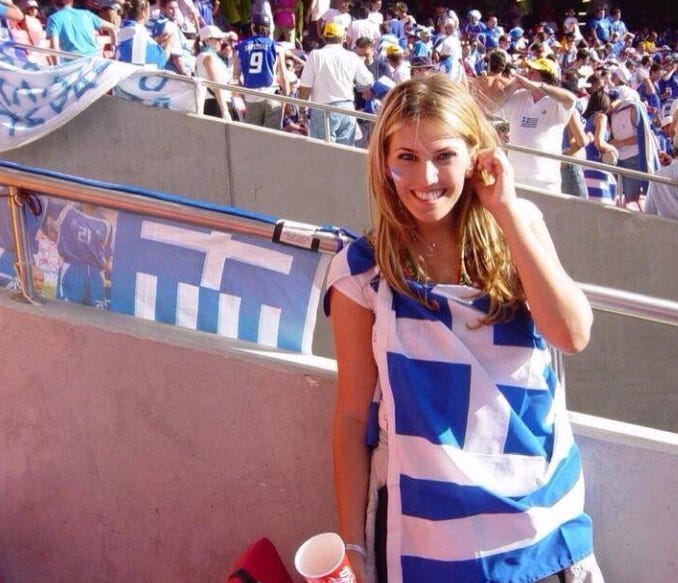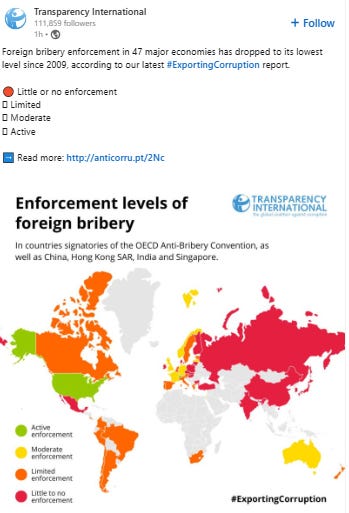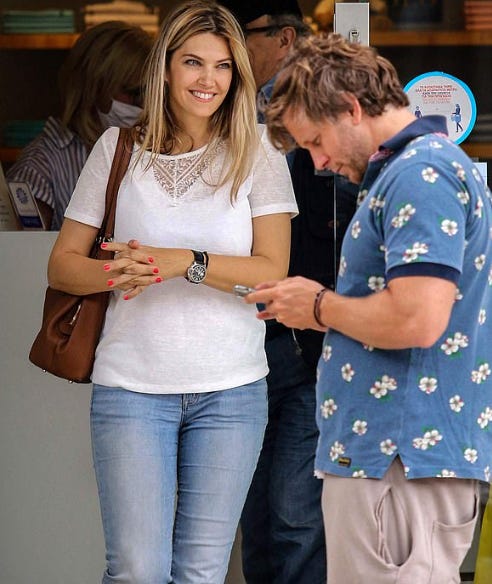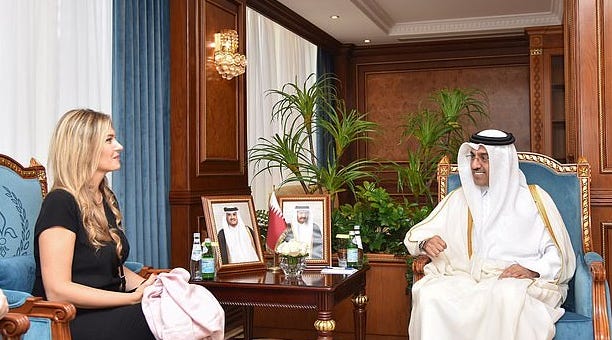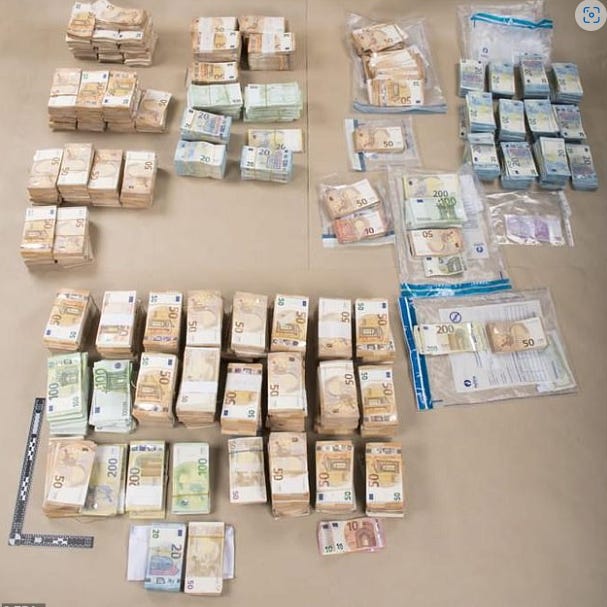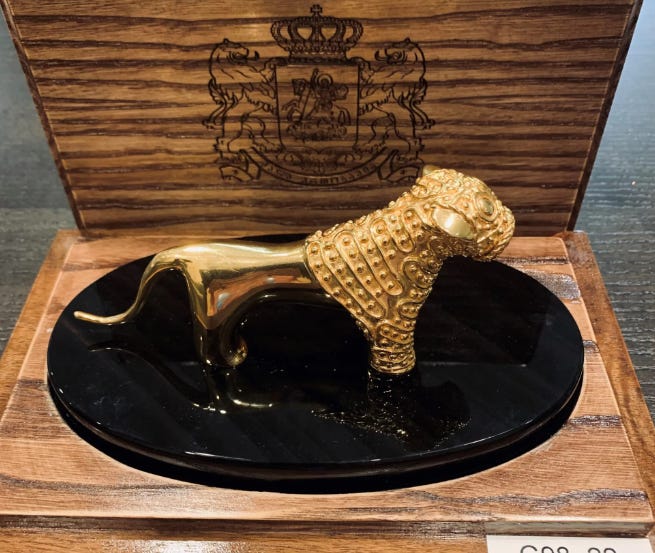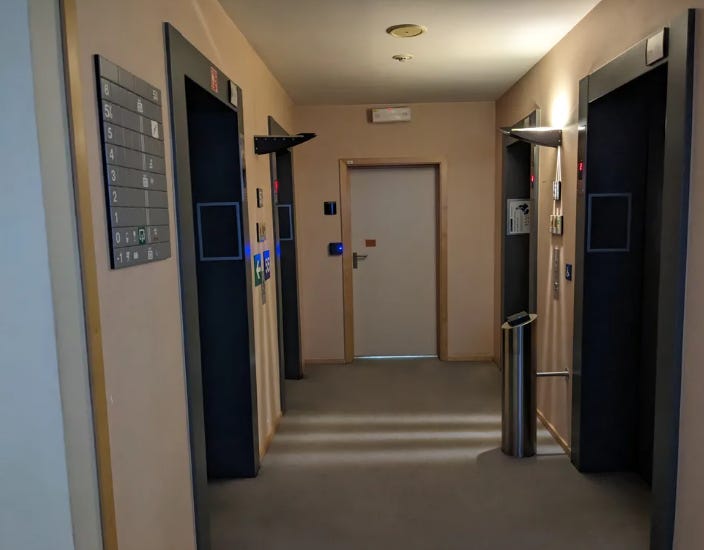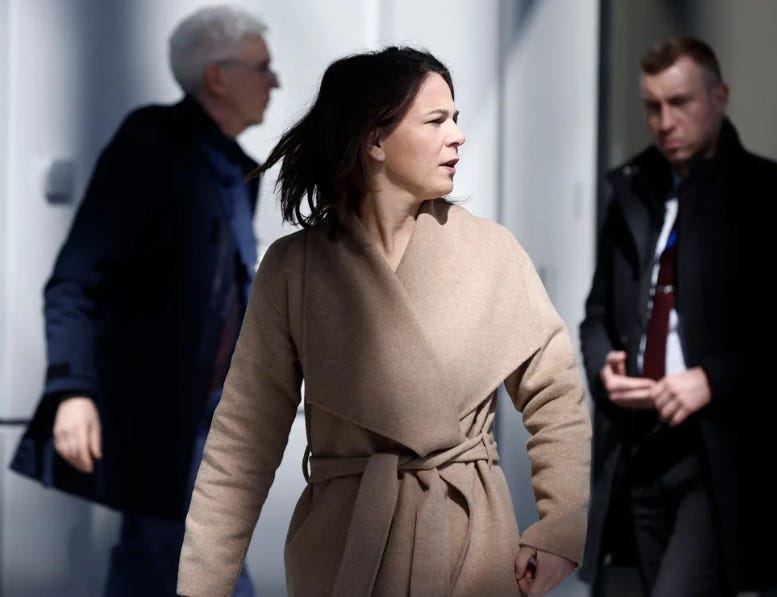European Parliament President Roberta Metsola missed a lawmakers' deadline for disclosing a luxurious free trip — including a sumptuous dinner and a €350 hotel room for herself and her husband — all paid for by an elite wine society.
(Eva Kaili)
(Roberta Metsola, with Zelensky)
In October 2022, Metsola traveled to Burgundy, a famous wine region of France, to take up an honorary position as a "dame" of a wine-drinking brotherhood called the Confrérie des Chevaliers du Tastevin, at a five-course dinner in a medieval castle.
The brotherhood paid for Metsola's stay at the five-star Hôtel Le Cep in the town of Beaune, in a room with cost €349 for the night, plus tax. This is not against any of the Parliament's internal rules but MEPs have until the end of the following month to publicly declare any travel, accommodation or stipends paid for by third parties, such as governments or NGOs.
The night in the hotel took place October 22 last year, but Metsola made her declaration on the Parliament's website on January 11 this year, long after the deadline for MEPs had passed.
Metsola was said: "As president of the Parliament, no. But if you want me to say whether from now on every time I go anywhere for anything, will I do it [declare the trip] as soon as security protocol considerations are through, I will do that.”
Metsola’s trip but (in the next time) to every EU member (and more concern aboit potential gift) maybe will be wore context: her) ambition to replace Ursula von der Leyen.
The top ranks of the European Parliament have slammed the door shut to a public cross-examination of Commission President Ursula von der Leyen over her personal role in negotiating a multibillion euro coronavirus vaccine deal with Pfizer.
Last month, lawmakers in the Parliament's special committee on COVID-19 proposed to invite von der Leyen to answer questions on the EU's largest vaccine contract, signed at the height of the pandemic. It was in the run-up to this contract that she is reported to have exchanged text messages with Pfizer's Chief Executive Albert Bourla.
However, at a closed-door meeting Thursday of the Conference of Presidents (CoP) — which includes the heads of all the political groups and the Parliament's president — leaders refused the request to hold a public grilling. Instead they decided to ask von der Leyen to answer questions in private at some point in the future, watering down the invitation to almost nothing.
"It was agreed that CoP will be able to raise ... [the Parliament's COVID-19 committee's] concerns in their next regular meeting with the president of the Commission," said an EU official with knowledge of the confidential discussions.
It's an ironic twist given that the controversy surrounding von der Leyen's negotiations with Pfizer has centered precisely on a lack of transparency. Now, any discussions that do eventually take place will happen in front of high-ranking MEPs and out of the public eye.
The European People's Party MEP in the room, Siegfried Mureșan, dismissed the suggestion that the group was protecting von der Leyen — also affiliated with the EPP — as a "conclusion in search of an argument."
"The broad consensus was that we’re in dialogue with her [and] that should continue in the formats that have worked so far and that we have established," he told.
Germany’s center-right Christian Democrats will support Ursula von der Leyen, not Metsola, if she chooses to seek a second term in 2024 as the EU’s top executive, party leader Friedrich Merz said Monday (April 17th).
Merz, whose party is Germany’s main opposition to Chancellor Olaf Scholz, made the remarks alongside von der Leyen, the European Commission president, who was in Berlin for meetings with leaders from her political family, the CDU.
“She has our support in the event of a corresponding willingness,” Merz said, adding that he had conveyed this to Scholz as well, expressing the hope that Germany would propose von der Leyen.
Von der Leyen, however, was coy about her intentions. The Commission president’s term will be up in 2024 after the European election, and von der Leyen has yet to officially say whether she will push for another five-year stint.
“For me, it is very important that we show unity and strength in the European Union in these critical times, and therefore the institutions work as united as possible,” she said. “And that’s why it’s not the right time for me at the moment to answer this question for a next mandate.”
Merz was also pressed about the so-called Spitzenkandidaten system — the process by which European political parties each select a lead candidate in the EU election to become Commission president. It’s still unclear whether the system will be used — or honored — in 2024, as von der Leyen was appointed to her job in 2019 without being a Spitzenkandidat for any party.
Merz stressed that Scholz’s coalition government had actually already struck an agreement to back the Spitzenkandidaten process. Von der Leyen only added that the design of the Spitzenkandidaten model will be “decided in due course.”
“Here, the European Council and the European parties — that means the Council and Parliament in the broadest sense — will play a decisive role,” she added.
Metsola never explicitly asked for their votes, but the European Parliament president was clearly campaigning.
“Ask me anything,” she declared, kicking off a forum Thursday night with about a thousand students at the University of Leiden, breezing through questions on everything from the war in Ukraine to the Qatargate corruption scandal, and bringing a bit of a rock star feel to the packed lecture hall.
The Maltese EU lawmaker was in the Netherlands on a two-day trip to drum up interest in the 2024 EU election — and, perhaps, to boost her own profile amid rumors she is eyeing Ursula von der Leyen’s job running the EU’s executive. Notably, she made a pit stop Friday morning to visit Dutch Prime Minister Mark Rutte, one of the EU’s most senior leaders, who lauded Metsola as “effective” and “strong.”
It was, essentially, an unofficial campaign starting gun, kicking off a year of political jockeying ahead of the 27 national votes that could spark a reshuffling of the EU’s top jobs — and determine Metsola’s future.
“It’s not enough that you vote, your friends need to vote,” Metsola implored the students. “And if they don’t want to, ask me and I’ll contact them.”
Metsola cast herself more as an ambassador for EU democracy than a political campaigner.
“Rather than a campaign — when I was elected, I said I wanted to burst through the Brussels and Strasbourg bubble: This is what I meant, by being here and doing this around Europe,” Metsola told reporters Friday morning.
Yes EU can
Metsola, 44, connected easily with the young crowd, reaping laughs and keeping the students’ attention while telling a slew of personal anecdotes about her first failed attempt to get elected as an MEP at age 24; her large Maltese family (she has four sons, whom she drives to school every day — and 26 first cousins); and her experience being a woman in politics.
A former student of electoral law, she told them she’s an elections wonk who devours political biographies. She is currently reading a book by erstwhile Obama speechwriter David Litt.
“The reason why I’m here is because I want to convince you to vote, to potentially run for elections, to fight for a cause you believe in,” she told the young people gathered there.
A Ukrainian student named Yana, 24, (who, like other students interviewed did not provide a last name) said she had lived under the Russian occupation of Bucha — liberated exactly a year ago just after Metsola visited Kyiv — and thanked the president for her support. “Roberta is very inspiring, very bright, very easy-going. She seems very human,” Yana told.
Metsola and the Parliament's spokesperson argue that she is not covered by the same rules as the other members of the 705-seat chamber when it comes to publicly declaring trips.
EU Parliament spokesperson Jaume Duch was told: "While these things have never previously been declared by Parliament’s presidents, President Metsola has chosen to do so in an unprecedented move to boost transparency and lead by positive example." He said that no travel expenses were ever paid for by a third party.
“Her travel by car was paid for and arranged by the European Parliament for security reasons, as is the case whenever the president travels,” another EU official said.
German Green MEP Daniel Freund explain that the Parliament should hold an amnesty in the coming days for late declarations of sponsored trips. Latest, Michael “Mick Wallace” (The Left, Ireland) posted his trip to China for transparency, a rare transparency if compare another “under radar” trip by Member of EU Parliament.
“I’m happy that Metsola goes fully transparent on her sponsored trips. As the president, she’s setting an example — especially when it comes to ethical rules. Her declarations come late," Freund said.
He added: "Every MEP should have a chance to catch up on their declarations in the next days. But after that, transparency rules must be taken seriously and misdeeds must be sanctioned."
The wine lobby carries considerable clout in France and in Brussels, as wine is a lucrative export and central to the bloc's trade policy.
The EU spends millions to promote sales of European wines outside the bloc each year, protects them from intellectual property theft under its system of geographical indications and subsidizes winegrowers through the Common Agricultural Policy.
The EU official defended Metsola's decision to attend the brotherhood event, which her official record stated involved her "induction as a dame of the organization."
“It’s European gastronomy and this is something she is proud to promote,” said the EU official, adding that the title conferred upon her involved carrying out “zero” activity. “If that makes her the object of ridicule, I can assure you its intention was simply to show everybody you can be open with everything,” the EU official said.
As Metsola attempts to push through reforms to the Parliament's transparency procedures, her own track record of declarations is coming under greater scrutiny.
Metsola had logged 142 gifts in a public register, breaking with years of parliamentary practice — but also missing a deadline that the written rulebook says should apply to her. Metsola and her team have vehemently rejected the idea that she broke any rules.
She told that her "appeal" was that those who make an effort to be more transparent should not be punished for doing so. "What I don’t want, and this is also an appeal, and this is also coming from a lot of colleagues, is that those who actually declared [gifts] are sometimes the focus rather than those who didn’t," the Maltese politician said.
The sharper focus on transparency and integrity at the Parliament in the wake of the Qatargate corruption scandal is also shining a light on sponsored trips by other MEPs.
Over 200 individual trips where accommodation, travel or both were paid for by a third party have been declared by MEPs since the start of the current legislature in 2019. The locations of these trips include many nondemocratic countries such as Venezuela, the United Arab Emirates, China, Bahrain, Kazakhstan, Azerbaijan and Syria.
Good Alarmed: Kaili’s Case
In a flurry of emails, Eva Kaili’s office in the European Parliament lobbied for prime placement despite not knowing who would attend. Kaili ended up at a table next to the EU’s jobs commissioner, Nicolas Schmit, directly behind Parliament President Roberta Metsola and the EU’s powerful industry commissioner, Thierry Breton.
By all accounts, Kaili — one of the most glamorous figures in Brussels’ political scene, a vice president of the Parliament and a celebrity in her native Greece — appeared to enjoy the evening, which included a video address by Ukrainian President Volodymyr Zelenskyy and barely veiled admissions by Metsola and Breton of their desire to become president of the European Commission.
Kaili’s approach to the seating plan, seeking proximity to power, was in line with the approach she’d taken during two decades in politics, going back to her first steps in politics as a student in Thessaloniki. Rounding out her second term in the European Parliament, she had every reason to believe that she, too, might soon have a seat in the front row.
Two days later, she was in jail.
In a sting operation that shattered the polite veneer of Brussels politics like a brick through glass, Kaili was arrested by Belgian police as part of a cash-for-influence probe involving three alleged accomplices. Of the four people rounded up in early December, including Italian former socialist lawmaker Pier Antonio Panzeri and Kaili’s own life partner, an Italian parliamentary assistant named Francesco Giorgi — all charged with accepting illegal payments from Qatar and Morocco in exchange for political favors — Kaili was by far the most visible, the most senior, the most politically ambitious.
A huge amount of information has come into public view since those whirlwind days, including allegations by Panzeri, printed in the Belgian newspaper Le Soir, that he paid Kaili €250,000 to back her 2019 election campaign. (Kaili’s lawyer, Michalis Dimitrakopoulos, called the Le Soir report “completely inaccurate” and “unscrupulous lies” presented by Panzeri and “without any evidence, with the sole purpose of saving him and his family from prison.”)
But Kaili’s exact role in the scandal remains poorly defined. Unlike Panzeri, she has yet to admit any wrongdoing and remains in jail more than two months after her arrest, with judicial authorities refusing to grant her conditional leave on the belief she is a flight risk and could tamper with evidence.
Kaili’s lawyers describe her as the innocent victim of other suspects in the case, namely Panzeri and Giorgi, who they say exploited her rank and status to advance their interests without her knowledge. The fact that Kaili, who has a 24-month-old daughter with Giorgi, has been detained for two months with limited access to the child amounts to “torture,” they argue.
Yet Kaili’s arrest warrant is adamant: It alleges she was a key member of the plot, who knew that illegally-obtained cash was being stored at her home, tried to warn accomplices after Giorgi’s arrest and courted Qatari Labor Minister Ali bin Samikh Al Marri, cited as a key figure in the case.
In an attempt to reconcile Kaili’s high-flying public profile with the allegations against her. From her modest beginnings in Thessaloniki, Greece’s second city, to national politics in Athens, then onto Brussels and the fateful weeks leading up to her arrest, what emerges is the portrait of a magnetic personality who strove relentlessly for higher positions, unconcerned about ideology or party loyalty or where she’d ultimately go, as long as it was up.
April 14th, 2023, Kaili is released from Belgian prison, placed under house arrest and fitted with an electronic tracker as she awaits trial in £1.3m Qatargate corruption scandal.
Eva Kaili, the 44-year-old former European Parliament vice president and MEP, was fitted with an electronic tracker as she now awaits trial for her involvement in one of the biggest scandals to hit European Union institutions.
The former TV presenter turned Socialist politician was joined by her lawyer as they drove out from Haren prison in northern Brussels in a blackout Mercedes.
They then drove to her apartment near the European Parliament, where she wound down the window to speak briefly to reporters.
Kaili, as well as other former EU officials, are accused of accepting bribes from Qatar and Morocco in exchange for influence in EU policymaking.
(Kaili & Giorgi)
Speaking to a heard of reporters briefly from her car, Kaili said: 'My daughter (Ariadni) is waiting for me so I'm very happy that I will be with her in a bit.” Her released not include her fiancée Francesco Giorgi.
Kaili has been dating Francesco Giorgi since 2020, and the pair have an 18-month-old daughter - Ariadni - together, though are not married.
Giorgi, a former parliamentary assistant and domestic partner of accused Greek MEP Eva Kaili, was arrested in mid-December as part of a probe into a cash-for-favour scheme involving a Persian gulf state, widely believed to be Qatar. Morocco is also suspected of having tried to yield influence over the EU law-making process.
Giorgi's lawyer said that a deal struck earlier this month between former MEP Antonio Panzeri and the authorities to reveal all elements of the criminal organisation won't change his client's position.
Qatar Beckons
No venture was to prove as fateful for Kaili, however, than her association with Qatar.
Kaili had already traveled to the emirate with Giorgi and Panzeri in 2020 but after she became a vice president of the Parliament in January 2022, she began planning more trips to the Gulf. At the end of October 2022, she was again in Doha where she praised Qatar’s labor reforms, after a successful push to get the consent of Parliament President Metsola for the trip.
According to four emails between Kaili and Metsola through freedom of information requests, Kaili spent months pushing Metsola to let her go to Qatar and Kuwait. Metsola signed off on the trip just one week before it occurred, but Hannah Neumann, a Green MEP who chairs the Parliament’s delegation to the Arabian Peninsula (DARP) where Kaili was a substitute member, was not informed. Neumann said Qatar had canceled a trip arranged for her delegation and that she was surprised to see Kaili going.
In the first email, sent in July last year, Kaili wrote to Metsola: “I am convinced that the EP [European Parliament] has a stronger role to play in the Gulf.” In that email, Kaili called for the establishment of a parliamentary assembly between Gulf countries and the European Parliament, and an EU summit with the Gulf Coordination Council, a regional group made up of Bahrain, Kuwait, Oman, Qatar, Saudi Arabia, and the United Arab Emirates.
In Doha, Kaili met everyone from the Emir of Qatar to the foreign minister and head of the Shura Council, the Gulf state’s legislative body. According to the Greek press, Kaili also met a man called Sakis Batsilas, a Greek who was the deputy CEO of Qatar’s FIFA 2022 World Cup, and a strategic adviser on the original bid in 2010. She tweeted that she talked about the “prospects” opened up by a forthcoming vote on a visa waiver for Qatar.
It was far from Kaili’s only efforts on Qatar’s behalf.
In the run-up to the emirate’s hosting of the World Cup, there was a flurry of activity around a resolution about its record on labor rights following an investigation by the Guardian which alleged that 6,500 migrant laborers had perished while working on World Cup construction sites. With the tournament set to kick off in late November, the stakes were high for Doha — negative publicity could stain the modernizing image its World Cup extravaganza was meant to promote.
Kaili and other lawmakers from the center-left Socialist and Democrats group had taken a favorable stance on Qatar’s labor record, arguing the Gulf country had addressed concerns by passing reforms. But not everyone in the European Parliament felt Qatar deserved praise. Lara Wolters, a Dutch lawmaker who belongs to the same group as Kaili, was one of Qatar’s most outspoken critics.
Ahead of a November 14 hearing with Qatari Labor Minister Ali bin Samikh Al Marri — whom Belgian prosecutors would later mention as a key figure in the cash-for-influence scheme — Kaili’s office repeatedly reached out to Wolters for a meeting. When Wolters’ office failed to follow up on the requests, Kaili approached her in the hallways of Parliament to press her case, according to a Parliament official with direct knowledge who declined to be named.
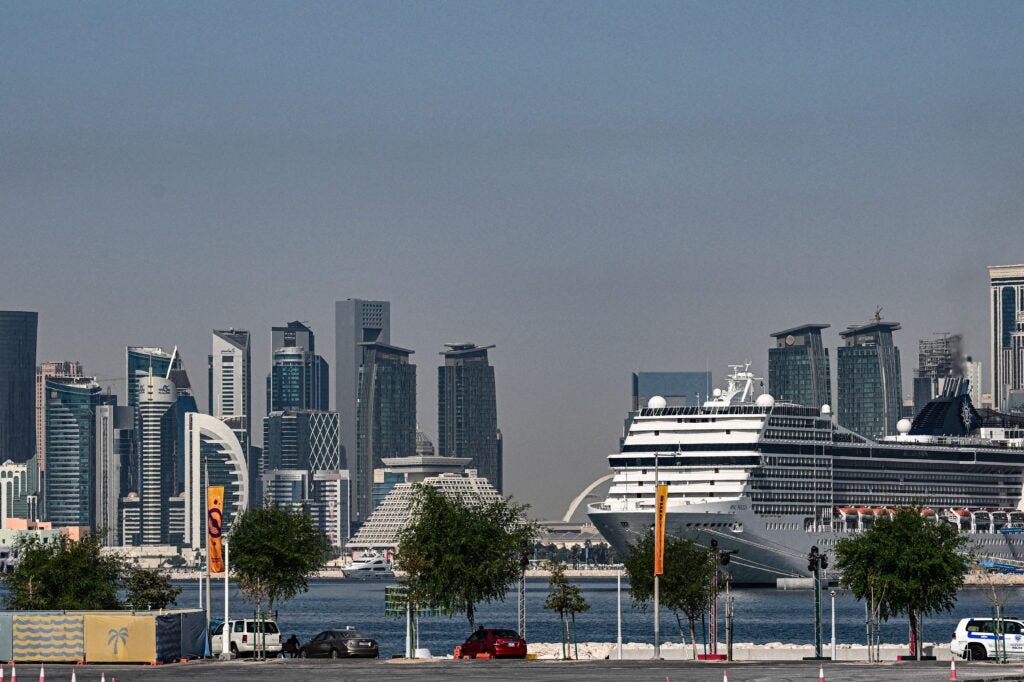
When Wolters got up to speak during the hearing, two other suspects in the case, Socialist lawmaker Marc Tarabella and Kaili’s partner Giorgi, were in the room. After Wolters spoke, Tarabella took to the microphone to offer a counterpoint, praising Qatar’s labor record. “I felt extremely uncomfortable,” Wolters told POLITICO. “I guess I realized the scale of the pushback.”
A lawyer for Tarabella said his intervention that day was “completely measured. All he’s saying is stop looking at things 10 years ago.” A lawyer for Giorgi did not immediately respond to a request for comment.
A week later, on November 21, the Parliament was due to vote on the resolution. It was at that time that Kaili delivered a speech in which she said: “I alone said that Qatar is a frontrunner in labor rights, abolishing kafala [a worker sponsorship system prone to abuse] and reducing minimum wage.”
Her speech done, Kaili made a beeline for Wolters, who was sitting in the audience. “Eva comes to me and essentially tries to stop me from speaking,” Wolters told the EU Scream podcast in February. “She kept insisting on the stuff that she said in her speech. She said, very personally, why are you doing this?” Undeterred, Wolters got up to deliver her speech, blasting Qatar’s labor record.
Kaili’s last public act in Qatar’s favor prior to her arrest came a few days later. The Gulf state had been lobbying the EU to grant its citizens visa-free travel to the bloc, and Parliament’s civil liberties committee was due to vote on a report about the proposal.
Despite not being a member or even a substitute member of the committee, Kaili showed up and voted in favor of the report. While this isn’t against Parliament’s rules, lawmakers are expected to inform peers and staffers of their intention to drop in for a vote. Kaili hadn’t done so. According to Gabriele Bischoff, a German member of the Socialist and Democrats group, the impromptu vote was enough to set alarm bells ringing among other members of the Parliament. Kaili’s vote in the committee was “totally against our rules,” Bischoff said.
“There was already a written complaint about it and talks [among S&D lawmakers], to say, to clarify what had happened there, that this is also against our internal rules, and to explore what had happened there,” she added.
The head of the Socialists and Democrats group in Parliament, Iratxe García, called Kaili to a meeting in Strasbourg to explain herself, according to somebody in the European Parliament closely involved in the process. But before the meeting could happen, Kaili was arrested.
Asked about Kaili’s lobbying, her lawyer said the suggestion she had a personal agenda for Qatar was a “big myth, which will be totally debunked.”
“Mrs. Kaili had no executive power, as is the case with all MEPs,” he said, arguing that the big decisions were made by the European Council and European Commission.
Bacchic feasting
Founded in 1934, the Tastevin brotherhood states that its mission is to protect the reputation of Burgundy wine and revive "old Bacchic confraternities" from the 17th and 18th century. Bacchus was the ancient Roman god of wine and festivity.
“We welcomed her as a wine lover and in her capacity of president of the EP,” the brotherhood's Quartermaster Arnaud Orsel explained, adding that it was a great "honor" to host her. Orsel and hotel staff also confirmed that Metsola's husband accompanied her during the trip.
The brotherhood served five courses paired with wine at the dinner. The menu included the typically Burgundian poached eggs in a meurette sauce made of red wine, with lardons, mushroom and onion. There are some 12,000 members of the club.
Lodged Gifts
Reaction is imminent after Qatargate.
Down a curving corridor on floor five and a half, there’s a dark alcove hiding an unmarked door.
This is the final resting place for the European Parliament’s would-be bribes.
The secret chamber is piled high with diplomatic gifts, all carefully labeled and left to languish in bureaucratic limbo under lock and key — neither accepted nor rejected.
There’s the opulent; there’s the bizarre. One cupboard contains a Taiwanese wristwatch given to a Polish EU lawmaker. Another holds a pot of French mustard, a miniature Saudi Arabian door and a commemorative plaque from the Indonesian parliament.
Expensive bottles of wine, children’s toys, wireless headphones, books, stationery, figurines — five dusty containers are brimming with the forsworn freebies that governments and parliaments from all over the globe have showered on EU lawmakers.
The crypt — essentially a glorified janitor’s closet — has sat largely unperturbed since the collection began almost 15 years ago. But in recent months, it has taken on a new significance due to revelations over alleged bribes that countries like Qatar, Morocco and Mauritania were funneling to EU lawmakers.
The scandal, dubbed Qatargate, has prompted soul-searching within Parliament, which is now squabbling over how to revise the code of conduct that governs lawmakers’ behavior — including what they should do when offered a gift.
But here, in room 55A031 of the labyrinthine Paul-Henri Spaak building, remain the gifts given but not received.
Too small a room
Outside, there is no indication about what the room contains. It is permanently locked.
Besides the renounced gratuities, the room stores old MEP files.
German Green MEP Daniel Freund — a vocal proponent of tougher transparency rules in the institution — plus three European Parliament officials, including a spokesperson.
The crypt is only accessible to a handful of Parliament civil servants — first and foremost Pekka Nurminen, a mild-mannered Finnish bureaucrat who is essentially the Parliament’s keeper of the gifts; the Parliament incarnation of Smaug, the dragon who guards a mountain of treasure in J.R.R. Tolkien’s 1937 novel, “The Hobbit.”
“It’s a bit anticlimactic if you expected some kind of treasure trove,” Nurminen said, standing on the squeaky linoleum floor of the vault as the air conditioning thrummed in the background.
With MEPs rushing to declare many more gifts than before in light of the Qatargate scandal, this storage room could soon become too small. Between 2009 and 2014, EU lawmakers declared just 15 gifts — but in this parliamentary term, which began in 2019, they’ve already registered 266.
The higher numbers are largely due to a massive dump of gifts by Parliament President Roberta Metsola, who declared 170 gifts since the start of the year — most recently a traditional shirt from the chairman of the Ukrainian parliament and a decorative box from Harvard University.
The president’s gifts are either displayed in her office, stored in this gift vault — or already long gone. When it comes to gifts of chocolates, wine or crunchy snacks, some have been “served in the course of Parliament’s functions,” i.e. consumed during official work meetings.
Even though she missed the internal deadline to declare many of the gifts, Metsola — who has been Parliament president since January 2022 — argued she was being radically transparent by declaring the gifts and turning them over. This broke with years of the institution exempting the president from declaring gifts on the public register.
Because of this change, many gifts given to previous presidents and kept in boxes by a set of civil servants called the “protocol service” are now being transferred to this room from undisclosed locations. The Parliament spokesperson described this gift vault as the only dedicated room where such gifts to former presidents are kept.
Just 17 gifts to presidents past and present are on display in glass cabinets at the Parliament’s seat in Strasbourg, next to a tiny kiosk selling Roberta Metsola-themed stamps. They include a statuette of a horse from the United Arab Emirates’ National Council; handmade artwork from the president of Nigeria; a silver bowl from top U.S. politician Nancy Pelosi; a peace-themed mosaic from Pope Francis; and a vide-poches or decorative tray from French President Emmanuel Macron.
Manfred’s mobile
For now, the gifts in the chamber in Brussels are essentially in limbo — neither displayed nor used — a fate that might perhaps make lobbyists or foreign dignitaries think twice about going to the trouble of making any such gesture in the first place.
A case in point is a Huawei smartphone that was worth more than €150 when given to European People’s Party chief Manfred Weber by the Chinese tech company — in 2013. It’s been gathering dust here ever since.
The “end of life” rules, as Parliament speak would have it, means dead but not buried.
Items end up in the room when lawmakers hand over something they received while representing Parliament. Under the current rules, written in 2013, MEPs have until the end of the month following receipt of a gift to notify and relinquish them. The Parliament’s administration then photographs the goodies and lists them on an online public register that’s regularly updated.
According to the current rules, EU lawmakers can keep these gifts permanently if it can be proved they have no “obvious” value to the Parliament. Or they may be temporarily displayed in their offices if the president gives her blessing.
In theory, parliamentarians can also bid to buy back their gifts in a public tender — but such an auction has never happened.
At a later stage of the ethics reform plan initiated by Metsola, senior parliamentarians could at some point tweak the code of conduct to allow the gifts to be given to charities — as happens with used furniture and food waste from the canteens. But such a tweak is currently not under consideration.
“If you have more presents handed into the institution, there needs to be a way to process them. So the existing 2013 rules might be revised,” the spokesperson said as the door quietly closed.
Exception
The European Parliament is moving to make it harder for representatives of Qatar and Morocco to influence MEPs, after the two countries were embroiled in a bribes-for-influence scandal dubbed Qatargate.
According to a new set of guidelines approved by leading MEPs in a behind-closed-doors meeting Thursday, MEPs and staffers are urged to request the Parliament’s permission to invite the countries’ diplomats onto the premises, and the lawmakers also have to inform Parliament President Roberta Metsola whenever they meet them.
The guidelines, however, are not binding — meaning that MEPs will not be sanctioned if they fail to adhere to them.
They are designed primarily to clarify the state of play for MEPs, and give Metsola and top civil servants better oversight about who is meeting who, amid an ongoing criminal investigation in Belgium into whether MEPs took bribes from Qatar and Morocco.
The move is separate from an ongoing transparency and ethics reform prompted by Qatargate that the Parliament wants to get wrapped up by the summer.
“Most likely this will lead to a situation where these rules are formalized in the future,” said a Parliament official speaking on condition of anonymity. “We need to know who they’re meeting, why they’re meeting. I think everybody understands that it cannot just be business as usual.”
The four-page document, marked “for internal use only,” also states that MEPs will not be allowed to take official trips to Qatar or Morocco while the criminal probe continues. However it does leave the door open for MEPs to take part in international events hosted by Qatar and Morocco, such as the Union of the Mediterranean parliamentary assembly, a format bringing together 44 parliaments including the EU’s, currently presided over by the Moroccan parliament.
The document also states that Qatari and Moroccan lobbyists who have logged themselves in the transparency register are banned from the Parliament’s grounds “as a precautionary measure in light of ongoing proceedings.” The effect of this measure, however, is minor because the guidelines only apply to lobbyists who voluntarily declare that their clients are from Qatar or Morocco in the register — which is almost certainly not all.
The Qatari embassy and the Moroccan embassy didn’t respond to requests for comment.
A majority of MEPs called in December and February for Qatari and Moroccan lobbyists to be barred from the Parliament.
However, there is an exception. “The President may grant access to the Parliament’s premises with a view to enhancing diplomatic efforts to end the war,” the document says. David McAllister, a center-right German MEP who chairs the foreign affairs committee which was consulted on the guidelines, told: “There should be exceptions in case opposition people [from Russia and Belarus] want to come.”
For MEPs, “bilateral contacts with representatives of these countries should be limited and only take place in the context of meetings of multilateral fora,” the document states.
The stance on China and Iran is slightly different because both regimes have sanctioned MEPs. The countries’ own parliamentarians are not to be invited to the European Parliament and trips by MEPs to China and Iran will only be authorized if a sanctioned MEP is part of the traveling cohort.
A spokesperson for Metsola said: “We’re trying to put a bit more order into the Parliament and codify things.”
Another exception already happens (but in government level, not EU MEP’s) because of result Macron’s trip to Beijing. Annalena Charlotte Alma Baerbock, a German FM and German Green Party heavyweight — known for her hard-line rhetoric on China deemed unpalatable by some in the coalition leader, the Social Democratic Party — avoided a direct clash with Paris.
“If you share a common internal market, then you cannot have different positions on the EU’s largest trading partner, [China],” she said. “With no partner do we coordinate so closely in the European Union as with our friends in France.”
She went on, however, to warn that some German businesses have built up a risky reliance on China.
Germany has “dependencies [on China] in some areas that are not healthy,” she said. “What is clear … is that the lessons we learn from the Russian war of aggression must, of course, also be learned with China in mind.”
China, on the other hand, warned Berlin not to “politicize” commercial relationship between the two countries, amid reports that Germany could review the partial sale of Hamburg port to China’s state-owned magnate Cosco.
“We hope Germany will not make normal commercial cooperation politicized, ideological and securitized, and put up artificial barriers,” Foreign Ministry Spokesman Wang Wenbin said Thursday.




